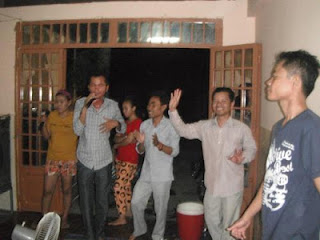For last year’s Pchum Ben Festival, I and the other Svay Rieng Peace Corps Volunteers ventured by bike to our friend Vannak’s house where we spent the day playing with puppies and piglets and riding water buffalo. (You can read my previous post about this trip here: http://mylifewithrice.blogspot.com/2013/05/this-is-my-friend-vannak-man-not-water.html)
For this year’s Pchum Ben Festival, I and 12 others again visited Vannak and his family, but this time we hit up his in-laws in Pursat Province. In Cambodian culture, once married, the newlyweds will often move in with the bride’s family, so Vannak’s house isn’t with his own family in Svay Rieng where he grew up but in Pursat Province with his wife’s extended family.

Vannak’s wife and her family cooking up a feast for all the guests.

Vannak and his son.
Since Vannak’s house is in an extremely remote village outside of the provincial town, the plan was for him to come in with his District’s ra’mourk (a motorbike pulling a flat trailer) that runs in the morning to allow villagers to get to the major market in the town. Alas, we were foiled by rainy season with pouring, incessant rain from early morning until almost 11. Since the ra’mourk wouldn’t be able to get through in those conditions, we had to find our own transportation. Vannak got us in touch with a neighbor who had taken his motorbike into town, and he helped us find a van to fit all of us. The van-finding, though, was done with protest, since he assured us that nothing larger than a tuk tuk (essentially a motorbike-drawn carriage) would be able to pass on the roads. Frugality prevailed and we ignored his advice, renting a van to take us to Vannak’s house.
The neighbor acted as our driver’s guide, leading us down increasingly poor dirt roads, until we reached a canal running between two narrow paths. We ventured down the first path, stopping short where the road narrowed too much. The second path yielded no more success. So we piled out of the van, thanking our driver for his effort and commitment to the cause, and we walked the remaining two kilometers. Vannak’s village is so entirely remote, that we walked over a kilometer without seeing a single dwelling. His village is what I always envisioned I would live in during my time with Peace Corps, the no electricity, no paved roads, no school buildings type village.

Making the trek on foot after our van could not pass.

Vannak’s back yard.
Upon arriving at the home, we greeted everyone in the formal Cambodian manner of placing our palms together, fingers up, and bowing slightly. We chatted with Vannak, and he showed us around the area a bit, taking special note of river where we immediately went swimming while lunch was being cooked. I’m fairly sure we were the first foreigners most of the children had ever interacted with, so we were quite the wary fascination for them, and we had a large crowd examining us during (and after) our swim.

Enjoying the peaceful calm on the river bank before jumping right in.

Tysor’s flock of children.

Me, trying to bond with Vannak’s kid.
Lunch blended seemlessly into hours of socialization. We all chatted together, goofed off, and made new friends. Eventually, the music came out and the dance party started. Thankfully, we got the older ladies of the house to bust a move with us, which is atypical for Cambodian parties, and everyone seemed to get a kick out of it.

Willia and Oum gettin’ down.
Long before we were ready to say goodbye, it came time to leave. The only form of transportation available in the village was a plow modified to run on the road and trailing a large board. We all squeezed on, saying our goodbyes and accepting invitations to return at the next holiday. Two of the guys followed us on a motorbike to ensure our safe return, which ended up being a lifesaver as one of the plow’s tires blew and the motorbike was able to go borrow a tire from a neighboring village (they also proved extremely helpful as retrievers of our shoes and sunglasses that the rough bumps took flying).

Our ‘car’ for the trip back to town.
The strength of Peace Corps comes in the relationships you form. Because of our friendship with Vannak, we were able to meet people and have an experience that otherwise never could have happened. We we able to gain perspective and connections and empathy for a community we otherwise never would have known existed. We didn’t make any difference in anyone’s lives (except maybe provide some amusing tales), but we changed our own lives. It’s hard to live the same way after you’ve been in a village where you had to go to the neighbor’s house because your friend’s house didn’t have a bathroom, where your seemingly easy request for dancing music resulted in a concerted effort to find a music player and car batteries with which to play it, where an obviously poor family found enough meat to add to the vegetables you brought because you didn’t consider that they would feel rude not to provide you with meat for lunch. We’ll never forget our trip to Vannak’s.






















